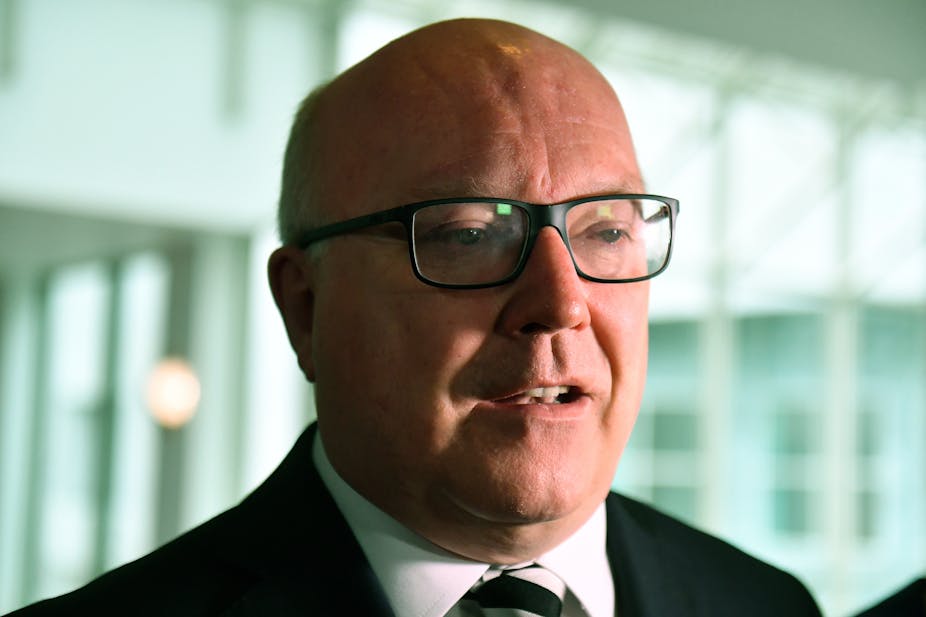Attorney-General George Brandis has insisted there will be no legal doubt over decisions taken by Deputy Prime Minister Barnaby Joyce and Regional Development Minister Fiona Nash while the High Court determines their eligibility to sit in parliament.
This comes as crossbencher Nick Xenophon has announced he will refer himself to the High Court after being advised he has British overseas citizenship through his father Theodoros Xenophou, who came from Cyprus, a British colony at the time. Xenophon will continue to vote in the Senate.
Meanwhile, cabinet minister Arthur Sinodinos has suggested that perhaps the Constitution’s citizenship section will eventually need to be addressed.
“Down the track after we have sorted this all out and the High Court have had a chance to look at this, maybe we need to go back to some of the reports of the parliament itself about the status of parts of Section 44 in the light of what happened in our society,” he told the ABC.
Joyce and Nash are under pressure from the crossbenchers and the opposition to stand down from the ministry while their status is determined. A third National whose parliamentary eligibility is before the court, Matt Canavan, resigned from the ministry.
All three were dual citizens when elected, and so could be ruled out under Section 44 of the Constitution, which prohibits dual nationals being eligible for parliament. The government, however, has said repeatedly it is confident the court judgment will be in their favour.
Brandis pointed to Section 64 of the Constitution, which allows a person to be a minister for three months without being in the parliament.
“I do not think there is a problem and I don’t think there’s any doubt,” he said.
Professor of constitutional law at Sydney University, Anne Twomey, in an article for The Conversation, wrote that the ministers’ decisions could come into legal doubt from when “they admit to being a dual national and refer to the High Court the question of their qualification to sit in the parliament, especially if the invalidity to hold parliamentary office exceeds three months.
"For this reason, it would be prudent for those ministers who are currently under a cloud concerning their lawful occupation of office to cease to make decisions which are contentious or might give rise to legal challenges with significant consequences,” Twomey wrote.
Brandis said the government would ask the court to deal with the citizenship issue urgently. “I think realistically that may be in the first fortnight of October,” he told Sky. The court now has the citizenship circumstances of seven current and former MPs to consider. The government has confirmed they are all paying their own legal costs.
The Nick Xenophon Team made it clear at the weekend that its House of Representatives member, Rebekha Sharkie, would not vote against the government on matters of confidence or supply. This followed Sharkie being reported in Fairfax Media saying she had decided she would no longer support the government on these. She said she was “quite frustrated with the prime minister” for retaining the ministers in cabinet.
In the weekend statement, Sharkie continued to call for Joyce to stand aside as minister pending the High Court decision. But the statement said: “NXT has made it clear that until the High Court decision, they expect to support the government on matters of confidence and supply”.
Xenophon said on Saturday: “Overnight I have received advice from the United Kingdom Home Office that they consider I am a British Overseas Citizen (a historical category of citizenship formerly known as a Citizen of the United Kingdom and Colonies).
"The UK Home Office has advised this on the basis that my father, Theo, was born in Cyprus when it was under British occupation, and migrated to Australia in 1951 – over 66 years ago.
"The great irony here is that my father left Cyprus in order to escape British Colonial rule.
"At that time he appears to have travelled to Australia on British Colonial travel documents.
"I was born in Adelaide, South Australia … in 1959.
"It was obviously unknown to me or my family that I was deemed to be a Colonial UK Citizen by virtue of the 1948 British Nationality Act.
"Cyprus became independent of its colonial power on August 16, 1960. At the moment of independence, every Cypriot lost their colonial UK citizenship status.
"I would have lost that colonial status as well if my father was living in Cyprus at the time or in any other country in the world except, according to the then British Nationality Act, these nine countries: Canada, Ceylon (now Sri Lanka), India, New Zealand, Pakistan, Union of South Africa, Southern Rhodesia (now Zimbabwe), Newfoundland (then a separate dominion, now part of Canada) and Australia …
"The oral advice from the UK Home Office last night is that this whole scenario is a quote ‘rare peculiarity’.
"Citizens of the UK and Colonies – CUKCs – without the right of abode in the UK, were reclassified as British Overseas Citizens on the 1st of January, 1983, after British nationality legislation was modernised.
"The UK Home Office now believes I am a British Overseas Citizen.
"I have made inquiries of the Home Office and researched what it means to be a British Overseas Citizen.
"The literature on this and oral advice from the UK Home Office is that this form of citizenship is quote ‘useless’, and indeed in many cases it confers fewer rights than an Australian citizen travelling on an Australian passport to the United Kingdom would have,” Xenophon said.

